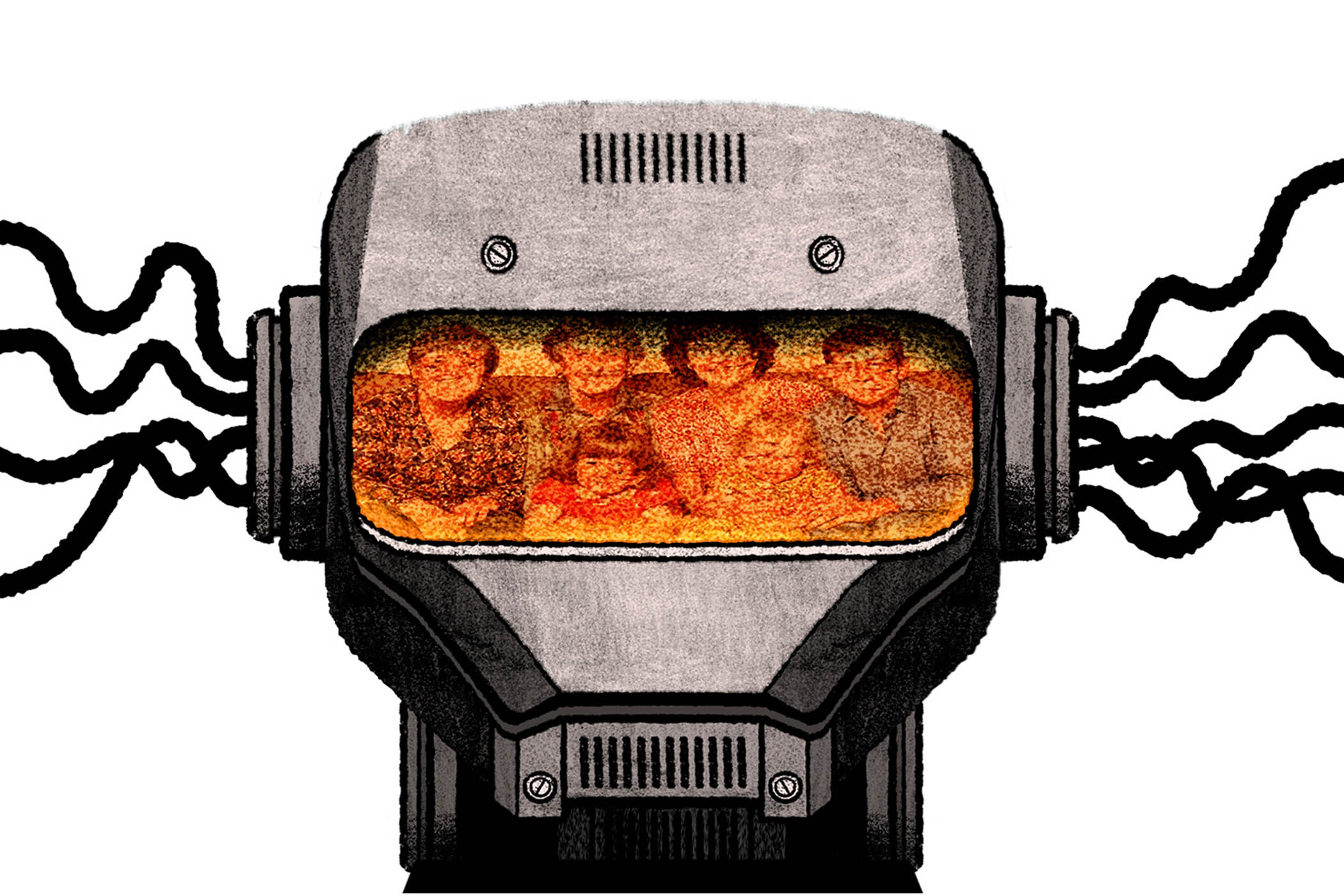Illustration by David Foldvari
Your parents are in danger. Your grandparents too. Definitely that one weird aunt who’s not really your aunt but is actually your mum’s friend, and who runs an unsuccessful crochet business from her garage. She’s patient zero. They’re all at risk from the threat of a new pandemic. The oncoming pathogen? “AI nostalgia slop”.
You’ve probably seen AI nostalgia slop online already, even if you’re not in one of the at-risk groups (boomers, morons, people who bought a blue tick on X, anyone who got into crypto just a smidgeon too late). It takes a few different guises, varying from the quaint but idiotic (“remember when the milkman brought your milk in the morning!”) to the sinister and hypnotic (cartoonified, retro home videos telling us to come back to the 1980s, because “the 80s misses you” and in the 80s you never had to remember how not to be scammed on your online banking). The AI characters stare through the screen and speak to you directly, saying things like: “It’s all real here. No filters, no screens.”
Chilling, maybe, but this engagement-baiting content is not AI nostalgia slop at its worst. At its worst, AI nostalgia slop is reactionary, nationalistic and increasingly racist. A growing trend has emerged of far-right talking heads and political figures encouraging us to remember a past that has been “taken” from us by some imagined other.
These adverts and posts usually follow certain well-worn tropes. They’ll feature sweet, blonde, cherubic children and encourage the viewer to imagine a past in which they could walk home from school on their own, elders were respected and dinner was always on the table by five. AI nostalgia slop imagines a past in which the buildings were classical, the people were nicer, the world was simpler. All the while never revealing to you, the viewer, that the creator of this post was born in 2002.
The US Department of Homeland Security has gone all in on AI slop recently. Its recent promotional material includes medieval knights with the slogan “the enemies are at the gates”, and a John Gast-style ICE recruitment poster featuring Uncle Sam accompanied by the slogan “Protect. Serve. Deport”. In other words, AI nostalgia slop isn’t just imagining a “simpler past”; it’s using dog-whistles to intimate a whiter past.
This stuff might seem remote to us, but it doesn’t just live on the screen, on someone else’s hellhole Facebook timeline. It bleeds into the real world too, and has ugly real world consequences. Earlier this month, Elon Musk, looking as busty and dishevelled as ever, appeared on a podcast where he babbled on about how England, Scotland and Ireland were countries of “hobbits” and “shires” which have been corrupted. “One day, 1,000 people show up in your village of 500 and start raping the kids,” he said. “This has now happened, God knows how many times in Britain.” How many times, exactly, has this specific thing which has never happened actually happened? Sadly, only God has the answer. Or the algorithm, which is basically God now anyway.
We owe it to our future malevolent robot overlords to stop feeding them a past that never existed
We owe it to our future malevolent robot overlords to stop feeding them a past that never existed
The more insidious problem with AI nostalgia slop, though, is that like all nostalgia, it contains a grain of truth which has been spun out into the memetic and ridiculous. As the Baz Luhrmann song Everybody’s Free (To Wear Sunscreen) recites: “Accept certain inalienable truths: prices will rise, politicians will philander, you too will get old – and when you do, you’ll fantasise that when you were young prices were reasonable, politicians were noble and children respected their elders.” It’s true that, by a number of metrics, things are worse “these days”. What the slop misses is that we have austerity, not immigration, to blame for that reality.
Related articles:
We’re poorer now: child poverty in the UK has hit a record high. Our food costs are stratospheric: by 2021, Brexit had cost UK households an extra £5.8bn in food bills, according to research from LSE. It’s increasingly difficult to buy a home: more than half of all boomers owned property by the age of 30 compared to less than 30% of millennials, the remainder of whom will continue to rent – from boomer landlords – long into their forties. The myth of social mobility from working has become more apparent. As one King’s College London study published in January finds, wealth inequality could be a “major driver of societal collapse” within the next decade. There is no mention of the milkman not bringing your milk any more.
But none of that is very sexy. The material reality – that life is getting worse for ordinary people because they are being exploited by billionaires – is gloomy. And it’s not exactly… clicky. It won’t draw in your crochet-loving aunt Yvonne. Luckily, there’s no need for accuracy when it comes to nostalgia slop. The roots of the word nostalgia – “nóstos” and “álgos”, or “return home” and “pain” – refer to a longing for home that is idealised or merely imagined. While nostalgia can be powerful, it can also be navel-gazing bollocks (it was once treated as a disorder).
And that was true even before AI arrived. AI has just made nostalgia more seductive, more convincing, more addictive. Not least because AI is itself nostalgic and backward-thinking: it can only learn from previous information and is therefore doomed to repeat and amplify the biases of the past. And it’s only going to get worse. A report from linguistic experts published last March found that as AI improves, its racial biases grow.
With AI we’re remaking the past for the machines of the future. We therefore owe it to our future malevolent robot overlords to stop feeding them a past that never existed in the first place. If we ignore the nostalgia slop that keeps imagining England as a huge, anthropomorphic lion being fed by a cartoon Winston Churchill, we ruin our own futures. This stuff might only be opium for Facebook aunts now. But it’ll come for the rest of us next. And then we’ll all yearn for a time when things really were simpler.
Newsletters
Choose the newsletters you want to receive
View more
For information about how The Observer protects your data, read our Privacy Policy



